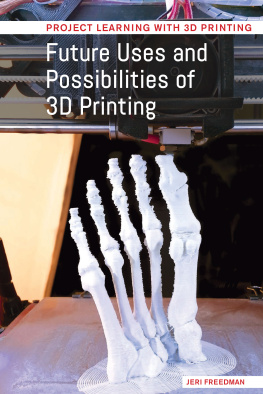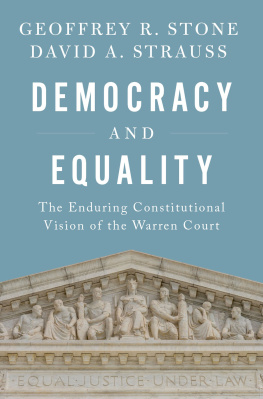Published in 2018 by Cavendish Square Publishing, LLC
243 5th Avenue, Suite 136, New York, NY 10016
Copyright 2018 by Cavendish Square Publishing, LLC
First Edition
No part of this publication may be reproduced, stored in a retrieval system, or transmitted in any form or by any meanselectronic, mechanical, photocopying, recording, or otherwisewithout the prior permission of the copyright owner. Request for permission should be addressed to Permissions, Cavendish Square Publishing, 243 5th Avenue, Suite 136, New York, NY 10016.
Tel (877) 980-4450; fax (877) 980-4454.
Website: cavendishsq.com
This publication represents the opinions and views of the author based on his or her personal experience, knowledge, and research. The information in this book serves as a general guide only. The author and publisher have used their best efforts in preparing this book and disclaim liability rising directly or indirectly from the use and application of this book.
CPSIA Compliance Information: Batch #CS17CSQ
All websites were available and accurate when this book was sent to press.
Library of Congress Cataloging-in-Publication Data
Names: Freedman, Jeri, author.
Title: Elizabeth Warren : Democratic Senator from Massachusetts / Jeri Freedman.
Description: New York : Cavendish Square Publishing, [2018] |
Series: Leading women | Includes bibliographical references and index.
Identifiers: LCCN 2016059794 (print) | LCCN 2017000069 (ebook) | ISBN 9781502626998 (library bound) | ISBN 9781502627001 (E-book)
Subjects: LCSH: Warren, Elizabeth. | Women legislators--United States--Biography--Juvenile literature. | Legislators--United States--Biography--Juvenile literature. | United States. Congress. Senate--Biography--Juvenile literature. | United States--Politics and government--21st century--Juvenile literature.
Classification: LCC E901.1.W37 F75 2017 (print) | LCC E901.1.W37 (ebook) | DDC 328.73092 [B] --dc23
LC record available at https://lccn.loc.gov/2016059794
Editorial Director: David McNamara
Editor: Tracey Maciejewski
Copy Editor: Nathan Heidelberger
Associate Art Director: Amy Greenan
Designer: Lindsey Auten
Production Coordinator: Karol Szymczuk
Photo Research: J8 Media
The photographs in this book are used by permission and through the courtesy of: Cover United States Senate/Wikimedia Commons/File:Elizabeth Warren--Official 113th Congressional Portrait--.jpg/ CCO; pp. US Senate/Alamy Stock Photo.
Printed in the United States of America
Elizabeth Warrens childhood home. Unlike many senators, she came from a modest background.
CHAPTER ONE
On the Ragged Edge
U nlike many senators, Elizabeth Warren doesnt come from a wealthy or powerful family. According to Warren, I grew up in a family on the ragged edge of the middle class. She was born Elizabeth Herring in Oklahoma City, Oklahoma, on June 22, 1949, the youngest of Donald and Pauline Herrings four children. Her three brothers were much older than she, and all three served in the military. One brother made a permanent career in the military, another became a construction worker, and the third started a small business.
The Dust Bowl and the Great Depression
Elizabeth Warrens parents had lived through the Great Depression and the hard times of the Dust Bowl in Oklahoma. The Great Depression (19291939) was the worst and longest economic downturn in US history.
It began with the stock market crash of October 1929, which led to the failure of a large number of banks and businesses. Unemployment rose as many companies failed and others cut back on workers. At its peak in 1933, thirteen to fifteen million Americans were unemployed and living on charity. The economy did not completely recover until World War II created a need for vast amounts of industrial production.
The Dust Bowl was the Great Plains region, a 150,000-square-mile (388,500-square-kilometer) area covering the Oklahoma and Texas panhandles and adjacent areas of Kansas, Colorado, and New Mexico. Devastated by drought during the Great Depression, ranches and farms failed, and the dry soil was swirled around by winds, creating dust storms. Nearly 60 percent of the population of the area left during this time.
Warrens parents often talked about their experiences in the Great Depression. According to Warren, They talked about it, those were the stories that permeated my childhood, what it was like to have seven years of drought, what it was like when nobody had any money, what it was like when all your neighbors left to go to California or someplace where they thought there might be jobs. Unlike some of their neighbors, Warrens parents stayed in Oklahoma.
Growing Up Middle Class
At the time Warren was born, her parents were struggling financially and often had a hard time making ends meet, but they considered themselves middle class, nonetheless. They firmly believed in education and insisted on using proper English, which they felt distinguished middle-class from lower-class people. Elizabeth took her first job when she was nine, babysitting for a family who lived across the street. At thirteen, she started working as a waitress in her aunt Bees restaurant. She grew up feeling that, although no one in the family had much of anything, they all tried to look out for each other. Reflecting on her childhood in an interview with Harry Kreisler of the Institute of International Studies at the University of California, Berkeley, Warren said:
People who didnt have family or people who broke from their family, they were the true poor, they were the ones with nothing. As long as you had family, you had people who would make sure that you got fed one way or another. Family was about canning peaches, and canning peaches was about making sure that thered at least be something come next November, when it was cold outside and there were no more crops coming in. Family is the heart of what its about.
When Warren was twelve, her father suffered a heart attack while working on the family car. Medical treatment resulted in huge medical bills, and her father was unable to work for some time. When he was ready to return to work, his job selling carpet at Montgomery Ward was gone. Instead, the company offered him a position selling outdoor products such as lawn mowers and fences. He was only paid a commission when he sold an item, so he no longer brought in a regular salary. The familys car was repossessed. Warrens mother, who was fifty years old, went to work answering phones for Sears, at minimum wage, to bring in money to pay the mortgage on their house. Eventually, her father left his job at Montgomery Ward and became a maintenance man at an apartment building.
Growing up in this hardworking lower-middle-class family instilled in Warren the importance of hard work and taught her how easily a middle-class familys finances could be destroyed by a single catastrophic problem. She felt she lacked the intangible things that having enough money gave her classmates: confidence, a feeling of security, and family stability. When she was campaigning for the Senate, she described her family as kind of hanging on at the edges by our fingernails.
Warren credits the conditions in which she grew up with shaping her worldview. The stories she heard from her parents and the hardships her own family went through gave her empathy for the plight of other hardworking families who found themselves in financial trouble because of a sudden unforeseen crisis. She developed a lifelong commitment to helping middle- and working-class families struggling to get by like hers.



















